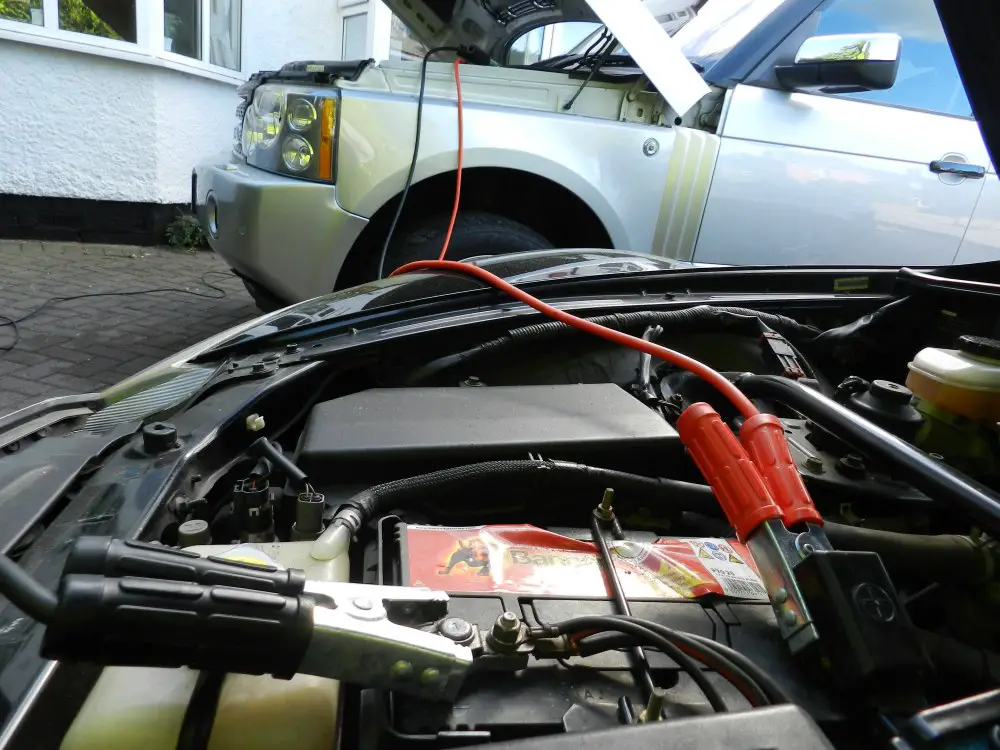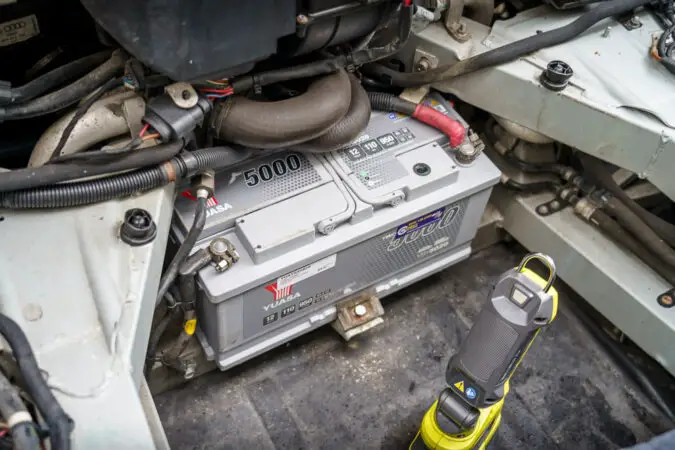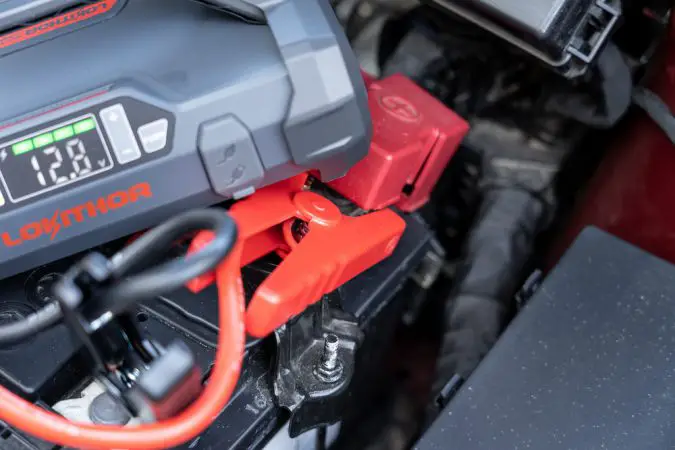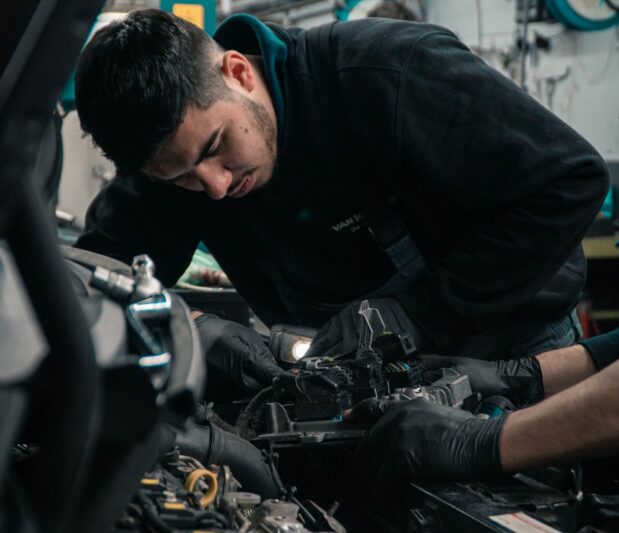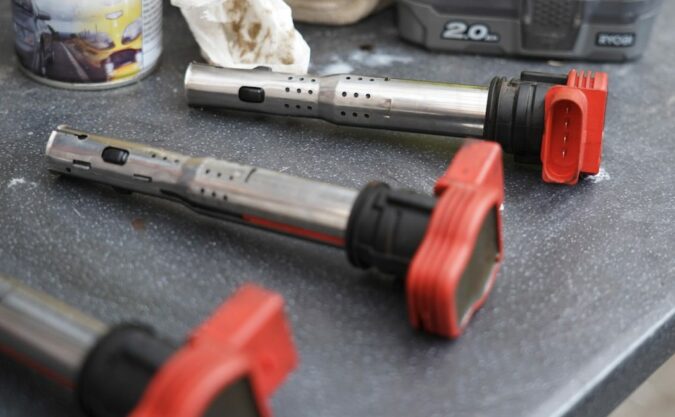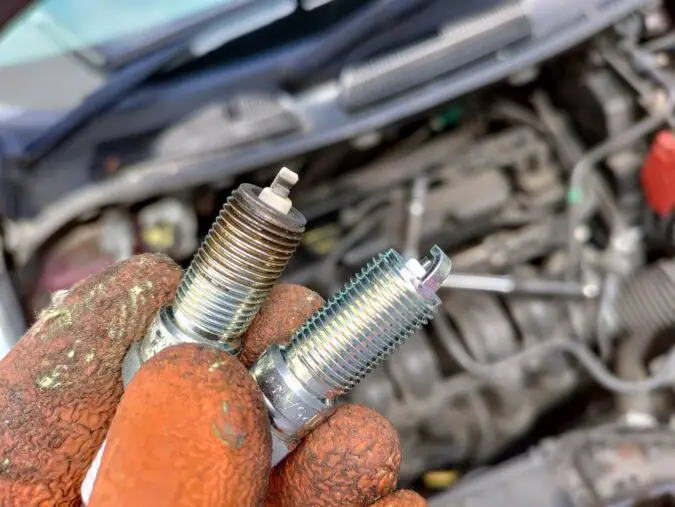So, you are preparing yourself to go to work. Аnd your car won’t start no noise at all? This issue may make some people angry. Especially, when they are desperately in need of a car at the moment. And they are not able to get the car started.
Let me tell you that this is not a big mechanical-related issue. But it is a frustrating thing, especially when you need your car the most.
Cars are made out of thousands of components, and some of them are known to go bad after some time. Such as the car battery. If you don’t track the age of the battery and don’t know how old it is. It may fail you all of a sudden and it can ruin your day.
If you are having these symptoms car won’t start with no noise. The most probable reason is the battery. But there can be other components that are bad and are drawing the juice out of it.
In this article, we are going inside this problem. We will also learn more about troubleshooting your issues when something is drawing the power out of your battery. There are plenty of reasons why your battery may be drained, so follow along.
Why Won’t My Car Start
It is very frustrating that you can’t start your car and you can’t go to work. Or maybe even on a date. It happened to me once, and I never forgave myself. Now I’m doing regular maintenance and I’m sorting all of these issues by myself.
In my situation, the battery was the issue. But that doesn’t mean that in every situation the battery gives up on you. There are plenty of other things in a car that may go wrong in a car and leave you stranded.
But in this article, we are going through the reasons why your car won’t start no noise. And there are a few of them. We shall discuss them thoroughly, and also point out some troubleshooting advice that will come in handy in your mechanical adventures.
We shall start from the simplest problems and then we will move on to more complex ones that may cause the car won’t start no noise issue.
Car Won’t Start No Noise Causes #1: Dead Battery
The battery is one of the parts that most frequently die off after it reaches the end of its lifespan. And one of the worst things about this is that you never know when or where could this happen. Batteries die off eventually, and you have to be prepared to replace it with a new one as soon as possible.
I personally believe in something that is called preventive maintenance. And preventive maintenance is replacing parts even before they die on you. This may save you from any potential hurdles with your car battery, spark plugs, etc. You get my point. These things die off and it’s better to replace them when they are still good.
For example, you are aware that you changed your battery three years ago. Now the battery is probably on the limit of its good lifespan. You never know when it may go bad and die off. So, go to the parts store and get a brand-new battery made by a reputable brand.
Don’t go with the cheap options. They are pretty much useless and they won’t last for more than two years. A day after the warranty is over, the battery is toast and you don’t even see lights on the dash. It’s dead like in our problem case, car won’t start no noise at all. Dead as a doornail to be exact.
Dead Car Battery Tricks
When you have a dead battery, you can’t do much. The battery is just dead and needs to be recharged. However, there are a few things that you can do if this situation ever comes about…
1. Call A Friend
In this situation, you can save yourself, if you have a car near you and you have jumper cables. Start the other car and connect your positive and negative cables to the positive and negative terminals on the other car. Then start cranking. It should crank a couple of times and then will start the engine. This is the easiest fix for you in this situation.
If this doesn’t work, then you need to check the battery terminals. If the terminals are oxidized and full of rust, grab an iron brush and brush off the rust from them. Clean the terminals up and try to jump-start the car again. This will probably work, and you will be good to go.
Just be aware that if your battery is old, it would not hold electricity for too long. Maybe you will get a few more cranks out of it, or not even that much. It will fail you soon after you get comfortable and think the battery is rock solid and it will never fail you again. That’s bad thinking. Don’t do that.
2. Get A Jump Starter
Another useful thing to have if you are jumping cars too often is to have a jump starter. This is a tool that you can carry with you wherever you go. This jumper has a powerful battery inside that can hold a few amps and it can jumpstart 5 or even 10 cars without recharging.
This is a useful thing to have if you are jumping dead cars all day. Or if you are too lazy to go and get a new battery. But these jumpers do not come cheap and cost a couple of hundred dollars.
The way they work is simple. It’s like someone is jumping up your battery with another car. But in this case, you have the jumper instead. You just turn on the tool, connect it to your positive terminal and you are good to go. The juice from the pack will go to your car and it will turn it on.
3. Push The Car To Start
Another good old method of turning on a car with a dead battery is by pushing. For example, if you have a couple of friends or family. They may push your car and it will start.
How it works is simple. You just put the car into gear and hold the clutch. While they are pushing you to release the clutch and the car should turn on by itself. This is an old and proven method that works all the time with every gasoline vehicle. But remember in order to work from the first time you need to gain some speed with the car. This speed is needed for the engine to get spinning and start the car.
Car Won’t Start No Noise Causes #2: Check The Fuse Box
Checking your fuse box is one of the first things to do when car won’t start no noise issue happens to you. All of the fuses are located in your engine bay under a big black box or behind the glove box. Every electrical device in your car has a proper fuse for it.
Fuses are made in case something wrong happen to your car. The fuses are designed to be blown. And help to prevent some major damage like fires and other very bad things that may happen to your car.
The first thing to do is to remove your positive battery cable and check the fuses one by one. If you found a fuse that is blown, then you need to find a new fuse to replace the old one. You can find these in your local car parts store.
Mount the new fuse, connect the battery cable and crank the car. If it runs then it’s ok. If it soon turns off again, some fuse has been blown. Repeat the procedure and check the fuses. If it’s the same fuse then its something wrong with that specific module. For example, fuel pump, coils, etc.
In this case, you need to connect your car to a computer and start scanning for codes. You will probably find your culprit among these error codes. Then you can address the issue. If you do not address the issue the fuse will keep popping out and you will have a bad working vehicle. And by doing this procedure you will prevent possible fire damage or some major electrical failure.
Car Won’t Start No Noise Causes #3: Check The Starter
If nothing reacts when you put the ignition key and turn the key over. It is probably a starter-related issue. The battery is good and the car has power. but when you crank it, the starter doesn’t turn the engine.
This may be caused by a couple of things:
- Bad ignition switch. This is a common issue. The ignition switch is connected to an electrical switch that is installed at the ignition lock mechanism. If you move your key around in the ignition, it may start the car.
- The starter solenoid control wire has a bad connection.
- The starter motor could be bad and can’t crank the engine
- Neutral safety switch problem
- Problem with the vehicle security system
All of these issues are connected to a bad starter. This may attribute to your car won’t start no noise issue. Replacing your starter with a brand new one will fix your problem permanently. So, if you want to invest some money into a new starter. You can learn more about the latter in our guide on the Honda Accord starter replacement cost. It will be the best idea when you are coming to these problems.
Car Won’t Start No Noise Causes #4: Check Engine Light
If you see a check engine light on the dash when you put in your key. It may be some problem with the electrical components. If you see a check engine light, and the light just doesn’t want to turn off. Then it’s something that’s seriously wrong with the fuses or the starter.
What can you do in this situation? Connect an OBD2 scanner to your vehicle. Scan the car for codes. After you scanned the car, collect the codes and then search online what do they mean. When you diagnosed the issue properly, then you can take your time and focus on finding a proper fix.
Many things may cause the check engine light. Some of them are more common like a bad starter or a bad battery. Then it’s time to fix these. Take your car to your mechanic, if you are not mechanically inclined, or just get the parts necessary from your local AutoZone. Then start wrenching at your house. You will learn a lot of things in the process, and also learn what to expect from your car in the future.
The check engine light may also appear because of bad ignition coils and bad spark plugs. This means that your car doesn’t have enough spark to crank.
Car Won’t Start No Noise Causes #5: Check The Coils
In order to check your coils, you will need the OBD2 scanner tool to perform this work. Just plug it in and you will read the codes. After you diagnosed the car and found the errors. You should try to clear them out. If you cleared them and the problem still persists, then it’s time to scan thoroughly and find the right coil that is causing all the problems.
Since the car doesn’t want to start, a couple of the coils are probably causing this issue. Maybe a whole bank is making an issue. Especially if you have a V8 engine. In this situation, it is a smart idea to replace all of your coils at once. This may come at a high price, but you are going to benefit in the long run. Swapping these coils should be easy. Just unhook your battery cable and remove the old coils and connect the new ones. Clear of the codes and you are ready to go.
If this doesn’t clear your codes then it’s the right time to check out your spark plugs and wires.
Car Won’t Start No Noise Causes #6: Check The Spark Plugs & Wires
Spark plugs and wires are known to cause a car won’t start no noise problem. If you are running an old V8 engine. Just remove a cable from its place to see if makes a spark when it cranks. If it doesn’t, you need to get a fresh pair of cables and spark plugs.
When you want to do this job on your car, you need to do these all at once. I know there are many spark plugs in the engine especially if you run a V8 that has a twin spark system. But doing this job properly will mean that your engine is going to run properly. Because you never know which spark plug or cable may be bad.
So, to be on the safe side it’s best to swap them all. After swapping them your system should work like brand new, and you should not face more issues. But if everything is ok with the starter, spark plugs, battery, fuses, etc. It means that you should look for your problem in the back of the car and that is the tank. You need to check the fuel, fuel pump, and all the other goodies that are pumping fuel in the engine.
Car Won’t Start No Noise Causes #7: Check Fuel Tank
If you are cranking your car but it doesn’t start, maybe you should start remembering when you added fuel the last time? If you get power and the car is clearly cranking but doesn’t start this is maybe one of the problems.
This may be the problem. Especially if you are trying to start a car that hasn’t been running for a long time. If the fuel door was opened the fuel has probably evaporated. Also, you should check your fuel tank for holes. This may be the case if the car is too old and hasn’t been running for many years.
Go underneath the car and make a thorough inspection. Check all the sides. If there are any pinholes or places where fuel can evaporate. If you are thinking that the problem is the fuel tank, there is an easy trick.
The Smoke Test
Get a smoke machine and pour smoke into the fuel door. If there are holes on the bottom of the fuel tank, smoke will start to come off. If it doesn’t, it means the tank is rock solid. In this case, you should start looking at your problem elsewhere.
Another issue may be just bad fuel. Gasoline doesn’t last for a very long time, especially if that time is a couple of years.
Open the fuel door and make a smell test. If it smells like fresh gasoline, you should not worry but if it smells funky then the fuel is bad. If you have old fuel, you definitely need to drain that tank down and unbolt it from the car. You can do this with common tools since it doesn’t require any expertise.
Drain the old fuel and give it a thorough wash. Place a flashlight inside and spot if there is some rust buildup inside. If there is rust, then it’s the best idea to not use that fuel tank and get a new one. If there isn’t rust inside you can just get a hose and clear all of the junk inside.
Drain the water and mount the tank. Pour some fresh fuel and you are ready to go. If then it cranks but still doesn’t run, the probable reasons are the fuel lines or the fuel pump.
Car Won’t Start No Noise Causes #8: Bad Fuel Pump
You can check if your fuel pump went bad very easily. Just turn on the key and you should be able to hear a clicking noise, right behind the back seat. This click means that your fuel pump (sender) has engaged and is pushing fuel to the engine. It is very important for the fuel pump to work properly if you want to have a smooth-running car.
If you found that the pump is bad, then you need to get a proper replacement pump. You can find these pumps anywhere, and they are really affordable. Also, the pump swap is very DIY-friendly. You just need to pop the back seat off and you will notice the pump. It is a round shape, usually under the left back seat. You will also notice two lines going out of it.
These are the fuel lines, and we are going to discuss them a bit later. On the pump, there should be a couple of bolts. You just pop them off and replace the old pump with the new one. But first remember to remove the battery terminals before you do this job, in order to do it as it should. After this job is done, connect the positive cable and give it a crank.
If the car turns on then great, but if you get an annoying check engine light it means that you have to clear off the codes. Because every time you swap a factory part that has some electrical sensors and is connected to the computer it means that you should do these steps.
Grab an OBD scanner and scan the car for issues. After the scan is done remove the tool and crank it on. If the car works properly then you are ready to take it for a test drive.
Car Won’t Start No Noise Causes #9: Check Fuel Lines
If everything is great with your fuel tank and your ignition, it is a good idea to check on the fuel lines. Especially if you also have a fuel filter. These filters can get clogged up and cause some major hurdles. Especially if you run a diesel vehicle. The diesel fuel has some impurities that require these filters (not to mention seeing why is diesel so expensive). And these filters need to be changed on time if you don’t want to have headaches.
Facts about What to Do When Your Car Won’t Start and Makes No Noise:
- A car not starting is a common experience that most drivers will encounter at some point.
- A “car won’t start no noise” situation is dangerous as it can potentially harm the driver or other cars on the road.
- A dead or dying battery is one of the main reasons for a “car won’t start no noise” occurrence.
- Some electrical components in a car can run on a low charge, but engine starters require much more power to turn the engine over.
- If the battery is in good shape, a blown fuse or faulty ignition switch might be the problem.
- Signs of a failing ignition switch include stalling while driving, constant power to the fuel pump and ignition system, and problems turning on accessories.
- A faulty starter can also cause a “car won’t start no noise” situation.
- Signs of starter problems include the need to jiggle the key, the car starting only in neutral, and dimming lights.
- If the engine cranks but won’t start, the issue might be with the transmission or fuel system.
- Other potential causes of a “car won’t start no noise” situation include a frozen fuel line, empty gas tank, clogged fuel filter, and faulty spark plugs.
Final Thoughts
In this article we went deep and learned quite a lot when it comes to troubleshooting issues with a car won’t start no noise problem. This is a relatively common problem that you may face while you’re owning a car. It depends much on yourself and how persistent are you in solving this issue.
As we said, the first thing you need to check out when dealing with issues like these is the battery. The battery is the first giveaway that will help to solve this.
If the battery isn’t the culprit, then focus on the starter. Check the starter and if it clicks and works properly then move on to the cables and spark plugs. If you do not find your issue in any of these places then it’s time to look at the back, and that is the fuel tank, fuel pump, and fuel lines.
Especially if the car isn’t driven a lot, one of these is maybe the issue. And after all, if you are not able to investigate what is the real issue it may be the best thing to take your car to your local mechanic. Leave them to do all of the hard work while you enjoy some rest.
Frequently Asked Questions
If you’re still curious to understand why your car won’t start no noise at all, our FAQs here might help…
How To Start A Car With A Bad Starter
If your car has a bad starter, there are still some techniques that you can try to get it going. If your car has a manual transmission, you can try something called push-starting. To do this, keep the ignition on and have the transmission shifted to 1st or 2nd gear while pressing down on the clutch pedal. Then, get someone else to push your car until it starts gaining momentum – around 5mph to 10mph. Once you reach this speed, let go of the clutch and press on the gas pedal. Otherwise, the starter might not be able to function if the car’s battery charge is too low. The other method that you can try is jump-starting the battery and letting it charge a bit before trying to start again.
Why Is My Car Not Starting
There is a myriad of reasons why your car is unable to start. Generally, we can categorize them into 3 possible issues – electrical faults, ignition problems, and fuel issues. With electrical-related issues, it could be that your car’s battery is dead or has a weak/low charge. Beyond that, your car might have some blown fuses or a bad starter. Either of which can prevent your car’s ignition system from functioning. Speaking of, faulty ignition coils or worn-out spark plugs will also prevent your car from starting. Without a functioning ignition system, your engine simply can’t start. In addition, the fuel systems in your car might also have malfunctioned. This includes running low on gas, having a leaky gas tank, ruptures in the fuel links, or a faulty fuel pump.
Why Is My Car Cranking But Not Starting
If your car is able to crank (but still won’t start), there are several possible reasons why this is happening. You can begin by checking your car’s electrical systems. Mainly, there’s the starter motor, where a weak starter motor may not be enough to properly crank your car. Otherwise, a low battery charge or blown fuse would also prevent the needed amount of electrical supply to flow to the starter motor. Beyond that, you should inspect the ignition and sparking units of your vehicle. This includes the coil pack and the spark plugs. If neither is able to fire and ignite the engine reliably, this explains why your car refuses to start. A lack of fuel – i.e. caused by fuel leaks, faulty fuel pumps, clogged fuel filters, or low gas levels – woulda also cause the engine to not start.
How To Start A Car With A Bad Ignition Switch
If your car has a bad ignition switch, the first method that you should try to get your car started is through bypassing the ignition switch altogether. Should your car be of an older model, you could attempt hotwiring it. This simply revolves around directly contacting the ignition, starter, and battery wires together. Alternatively, you could practice a similar technique by using jumper cables. This time, you’ll have to bridge the battery and the ignition coil directly through the jumper cables. When neither can get your car started, the final method that you can try is by using a drill and screwdriver. Simply drill into the ignition cylinder through the keyhole and use a screwdriver to twist and force the ignition switch to start. This will destroy the ignition switch, though.
Why Won’t My Key Turn In The Ignition
There are several reasons why your key might not be able to turn in the ignition. In most cars, there’s a steering wheel lock mechanism that tries to prevent your car from being stolen. When the wheel locks, it could also lock the ignition key from being able to turn. Otherwise, some cars also prevent the ignition key from turning when your gear shifter is set to Park or Neutral. Moreover, there are cars that outright prevent you from turning the ignition key if the battery is dead. If not, you might be dealing with either a faulty key or a stuck ignition switch. Using a worn-out or bent key would prevent it from smoothly being inserted into the ignition cylinder. Meanwhile, stuck springs and obstructions within the ignition barrel would prevent the key from inserting fully.

